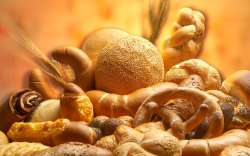çÈîÅõ
Updated: 2014.04.11
 |
khâ•meitzꞋ (corrupted to "chomets" and "hummets").
Ancient Israel & Biblical definition:
all dough (and foods produced from it), other than îÇöÌÈä, that is
made from The Five Species.
ùÒÀàåÉø is a subset of çÈîÅõ.
Resting & Proofing (dough) — Typically, when making bread, dough is kneaded a first time, then "rested" – allowed to sit and rise (leaven), kneaded again and then "proofed" (a second, shorter, rest period for a final leavening).
Modern European Rabbinic Reforms
Modern rabbis contravening
Scripture prohibits the universal Orthodox (and Ultra-Orthodox) practice of placing offending products in a cupboard or closet that is then taped closed for the period of Khag ha-
Needless to say, the
Preventing çÈîÅõ: Kneading-To-Cooking Time Limit
The kinds of grain that form çÈîÅõ after being wetted and allowed to "rest" were defined by Talmudic times as The Five Species; and the maximum time that flour from The Five Species were permitted to set before evidence of çÈîÅõ was observed was set at the length of time it takes to walk a Roman mile [.92 mi., 1.48 km], when the surface of dough that had not been seeded with ùÒÀàåÉø would begin to pale. (indicating this was almost certainly tradition handed down from practice in the time of RibꞋi Yᵊho•shuꞋa – which, therefore, logic dictates must be assumed until proven differently), the rabbis defined five bread grains that, under two other conditons, form çÈîÅõ.
Therefore, unless carefully guarded, might develop (and contain) leaven (yeast). The list of modern products has grown from cereals to pages of listings from spaghetti to canned foods and powdered soups, to condiments containing yeast, dish and kitchen cleaning products, water softeners, lipstick, toothpaste, coffee, soft drinks, used toothbrushes, laundry detergents, floor cleaning products, bleach, Chandelier Cleaner, Coppersmith's Polish, European Jewelry Bath and silver cleaner, Fine China Separators, Fork Cleaner and grain-based whiskeys. Today, one must consult a list at the Orthodox Union website or the like.
Scripture
The Biblical injunctions concerning çÈîÅõ are less rigorous than ùÒÀàåÉø.
Shᵊm•otꞋ 12.34 – The kindred grabbed áÌÀöÅ÷åÉ before éÆçÀîÈõ
Shᵊm•otꞋ 12.39 – And they baked äÇáÌÈöÅ÷ that they took out ofMi•tzᵊraꞋyim , òËâÉú îÇöÌåÉú because ìÉà çÈîÅõ, because they were being driven out ofMi•tzᵊraꞋyim and unable to delay [for the áÌÈöÅ÷ to rest and rise into çÈîÅõ].
Ho•sheiꞋa 7.4 – … burning like the oven of a baker, until He shall cease îÅòÄéø – from the kneading of the áÌÈöÅ÷ until çËîÀöÈúåÉ (A reminder: Reconciling 𝕸 withTar•gumꞋ Yo•nâ•tânꞋ has baffled the Sages. This translation, accomplishing the reconciliation, is copyrighted with all rights reserved – like every page, and all content, in this website.)
Tᵊhil•imꞋ 73.21 – my heart éÄúÀçÇîÌÅõ
The following (exhuastive) Scriptures instantiating çÈîÅõ prohibit the universal Orthodox – and Ultra-Orthodox – practice of placing offending products in a cupboard or closet that is then taped closed for the period of Khag ha-
Shᵊm•otꞋ 12.15 – anyone who eats çÈîÅõ shall incurkâ•reitꞋ , from the first to the seventh day (of Khag ha-Matz•otꞋ )
Shᵊm•otꞋ 13.3 – çÈîÅõ may not be eaten
Shᵊm•otꞋ 13.7 – çÈîÅõ shall not be seen of yours … (nor ùÒÀàåÉø seen of yours) … within any of âÌÀáËìÆêÈ
Shᵊm•otꞋ 23.18 – (not specific to Khag ha-Matz•otꞋ ) you shall not sacrifice blood of My sacrifice on çÈîÅõ
Shᵊm•otꞋ 34.25 – (not specific to Khag ha-Matz•otꞋ ) you shall not slaughter blood of My sacrifice on çÈîÅõwa-
Yi•qᵊr•âꞋ 2.11 – (not specific to Khag ha-Matz•otꞋ ) anyMi•nᵊkh•âhꞋ that you offer toé‑‑ä you shall not make çÈîÅõwa-
Yi•qᵊr•âꞋ 6.10 – (not specific to Khag ha-Matz•otꞋ )Mi•nᵊkh•âhꞋ – shall not be baked çÈîÅõwa-
Yi•qᵊr•âꞋ 7.13 – (not specific to Khag ha-Matz•otꞋ ) uponkhal•otꞋ lëkhꞋëm çÈîÅõ shall he offer hisqor•bânꞋ , over azëvꞋakh oftod•âhꞋ -Shᵊlâm•imꞋ .wa-
Yi•qᵊr•âꞋ 23.17 (re: wave two loaves) – (not Khag ha-Matz•otꞋ ) they shall be baked çÈîÅõ
Dᵊvâr•imꞋ 16.3 (re:PësꞋakh sacrifice) – you shall not eat çÈîÅõ over it
(çÉîÆõ is sour wine; i.e., vinegar.)
Google+ registered author & publisher
Google+

